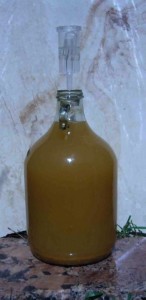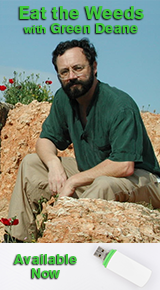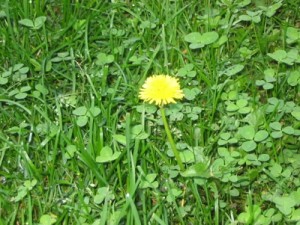 I am often invited to see someone’s vegetable garden, and it’s usually growing well. Then I’m asked if I see any edible weeds, and usually there are some. I point them out. Then I hear something like, “oh, is that what it is?” There is professed interest but few of these gardeners ever eat any of these weeds. Baby sow thistle in a vinaigrette is not on their menu.
I am often invited to see someone’s vegetable garden, and it’s usually growing well. Then I’m asked if I see any edible weeds, and usually there are some. I point them out. Then I hear something like, “oh, is that what it is?” There is professed interest but few of these gardeners ever eat any of these weeds. Baby sow thistle in a vinaigrette is not on their menu.
At first that would seem a strange, after all a vegetable garden is all about raising food, fresh and nutritious. But on reflection perhaps a gardener’s reluctance to eat weeds is understandable. Weeds don’t need gardeners whereas cultivated crops are almost entirely dependent upon gardeners. Weeds are independent adults who go their own way, crops need protection like children and die off without constant supervision and intervention. Weeds are kind of like relatives… you can’t choose them. Cultivated crops are like friends you want to keep.
That may be stretching psychology a little, but once something is labeled a weed, or more so a noxious weed that threatens agriculture, it ceases to be a positive plant. It becomes a drain on resources; space, water, sunshine, fertilizer and time. The sow thistle we welcomed a century ago into our garden is now chemically killed. Or looked at it another way: The sow thistle wasn’t as clever as spinach. We can believe we choose which crops to cultivate, or perhaps the crops choose us. I like to make the analogy between plants and canines.
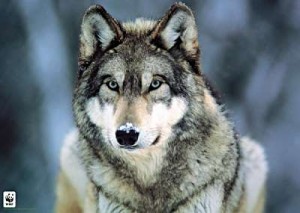 In the United States there are some 75 million dogs, and only about 15,000 wolves. The dogs are clearly giving people something people want and the wolves are not. We recognize wolves as the superior canine but it is dogs we choose to raise. One in three of us “own” at least one dog. Weeds are the superior plant, but we raise crops. As dogs have outwitted wolves, crops have outwitted weeds.
In the United States there are some 75 million dogs, and only about 15,000 wolves. The dogs are clearly giving people something people want and the wolves are not. We recognize wolves as the superior canine but it is dogs we choose to raise. One in three of us “own” at least one dog. Weeds are the superior plant, but we raise crops. As dogs have outwitted wolves, crops have outwitted weeds.
Cultivated crops seduced man with taste, texture and energy. Weeds offered more nutrition. They lost. There is one more aspect, ease of cultivation. Like the dog who figured out — if I act friendly they’ll feed me — some crops figured out if they are easy to grow man will do all the work of taking care of them.
Weeds fight a constant battle with their pest, and as a consequence succeed or die off. They are strong. Crops are totally depend upon man to fight off the pests. They are weak. Like dogs and wolves there are 11 million acres of potatoes planted every year but not one acre of spurge nettle or even cattails, though the latter of which produces more starch per acre than potatoes. The potato is clearly playing the game of popularity better than the spurge nettle or the cattail. But who or what is controlling whom?
The problem is man’s seduction by crops, also know as agriculture. Like run-off nutrients into a lake crops have produced a bloom in the human population. We are under cultivation by crops and now nearly 7 billion of us on a planet that would support without crops only one million. Paying attention to crops is a major portion of all human activity. It is the fabric of civilization itself. We like to think we are the crops’ masters but it just might be the other way around. We are doing what they want. But more importantly will or can crops protect us when a human pest comes around?
Animals and plants that gain and benefit from out favor cannot survive without us. If humanity dies off cultivated crops and dogs will disappear. But, there will still be weeds and wolves.
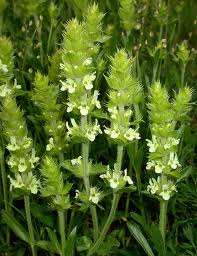 The last time I visited relatives in Greece, September 2006, I had “tea” with one of two then-living first cousins of my grandmother, both in their 90s, Maria and Alexandros Karantzalis. And while that might be relevant to write about here some day, it was the tea that was interesting. It was quite nice. My relatives sent me on my way with some. That tea, of course, was not oriental tea but resembled it. I learned in time it was an herbal mountain tea, Sideritis usually.
The last time I visited relatives in Greece, September 2006, I had “tea” with one of two then-living first cousins of my grandmother, both in their 90s, Maria and Alexandros Karantzalis. And while that might be relevant to write about here some day, it was the tea that was interesting. It was quite nice. My relatives sent me on my way with some. That tea, of course, was not oriental tea but resembled it. I learned in time it was an herbal mountain tea, Sideritis usually.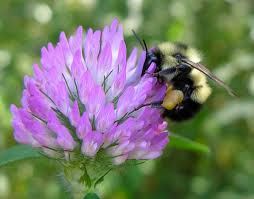 Last week, a year and a half later, I wondered…. I know it likes to grow on cool mountains but … I shook the package and got about 70 seeds. I put them in little peat pots. None have sprouted yet. No doubt I violated some law, which brings me to lawyers. Do you know real estate lawyers now advice against clover because it attracts bees and bees sting and stings can lead to law suits. I think we need more bees and less lawyers (and I say that as one accepted to law school.) Most of the folks elected to state legislatures are lawyers, and they spend their time making laws. That seems to me like an incestuous conflict of interest. Perhaps being a lawyer should automatically disqualify someone from holding public office… Bee keeping might be appropriate….
Last week, a year and a half later, I wondered…. I know it likes to grow on cool mountains but … I shook the package and got about 70 seeds. I put them in little peat pots. None have sprouted yet. No doubt I violated some law, which brings me to lawyers. Do you know real estate lawyers now advice against clover because it attracts bees and bees sting and stings can lead to law suits. I think we need more bees and less lawyers (and I say that as one accepted to law school.) Most of the folks elected to state legislatures are lawyers, and they spend their time making laws. That seems to me like an incestuous conflict of interest. Perhaps being a lawyer should automatically disqualify someone from holding public office… Bee keeping might be appropriate….

